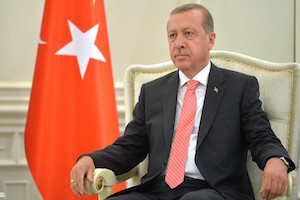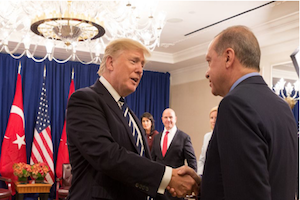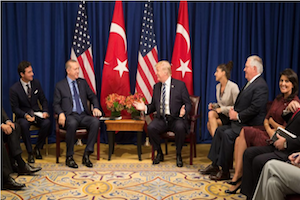A "Eurasian Turn" in Turkish Foreign Policy? Not Likely
By Toni Alaranta
January 31, 2018
No substantial “Eurasian turn” of Turkish foreign policy is likely – or at any rate likely to be lasting. However, the deterioration of the Turkish-Western relations has nonetheless helped bring about an unholy alliance of various “anti-Westernists,” secularist-nationalists and Islamists, which is anything but insignificant in terms of domestic politics. The regime has been bolstered, as it can now count on being supported by at least some secularist nationalists in the name of “anti-imperialism.”

Turkey's Toxic Mix: Fear, Loathing and the Empowerment of Paranoia
By Gareth H. Jenkins
January 22, 2018
The combination of the growing sense of empowerment amongst supporters of the Turkish government and the recent proliferation of reports that they are arming and organizing has reinforced concerns about not only the rule of law but also the risk that the country’s already severe social tensions may lead to communal violence.

New Turkey: Neo-nationalist or the reincarnation of the "Old"?
By Cengiz Candar
December 20, 2017
The roots of President Recep Tayyip Erdoğan’s “New Turkey” can be found in the decades that preceded the foundation of the Turkish republic. The ultranationalist Young Turks who ruled the Ottoman Empire during its final years – with catastrophic consequences – have extended their tentacles into the present. To preserve his power, Erdoğan has made a Faustian deal with their incarnations.

Living on Different Planets: Washington, Ankara and the Zarrab Case
By Svante E. Cornell and Halil Karaveli
December 6, 2017
Reza Zarrab’s testimony in early December to a New York court was hardly helpful in breaking the impasse in Turkish-American relations. By implicating Turkish President Recep Tayyip Erdogan directly in the oil-for-gold trade that is the subject of the trial, Zarrab may have contributed to a new low in the fraught alliance. However, the case is symptomatic of the fact that Turks and Americans lack basic trust. It also illustrates that they are now on completely different frequencies. The Zarrab case means entirely different things to Turks and Americans, and this disconnect risks contributing to a break that neither party may actually want.

Between Pressure and Paranoia: No Easy Answers for US-Turkish Relations
By Nicholas Danforth
November 8, 2017
In both the United States Congress and Executive Branch, previous efforts to assuage Turkish President Recep Tayyip Erdoğan’s anti-American anger are increasingly being seen as a form of appeasement. However, the risk is that Erdoğan’s paranoid view of American intentions could prevent Ankara from responding rationally to the pressures of the United States. Matters are complicated by what appears to be the Turkish president’s genuine belief that the United States is seeking to depose him.



